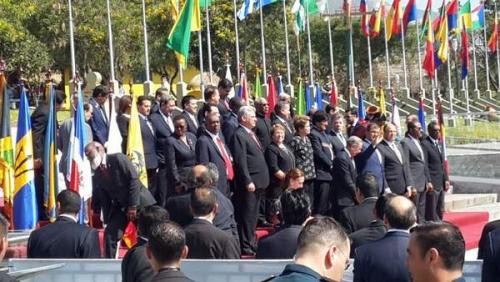President Rafael Correa of Ecuador opens the CELAC summit
Correa stressed the need for regional development and was condemning of the great forces of financial capital which sacrifices everything: human beings and the planet included, in the pursuit of profit.
- Opinión

33 Heads of State or their official representatives arrived at the UNASUR headquarters from 6.30am this morning to be welcomed by their host amid a colourful and musical welcome. Taking place in the Nestor Kirchner building, named after one of the protagonists behind the CELAC grouping, the president gave some reflections on important issues that the region faces.
Alluding to five axes in which the region needs to advance, Correa stressed the need for regional development and was condemning of the great forces of financial capital which sacrifices everything: human beings and the planet included, in the pursuit of profit. Not all the ears listening would have approved.
According to Correa the region needs to advance in the reduction of poverty, peace in Colombia and justice and dignity for all.
In terms of taxation, he noted that whereas in regions such as Europe personal taxation is on average 35.7% of income, in the CELAC region the level drops to 22%. The difference could fund all the development that the region requires. He noted that the region should be a society with markets, and not a society for the markets.
Citing the case of his own country, Correa talked of the importance of a basic wage and how companies that don’t pay them should not be allowed to distribute profits to shareholders. He also referred to the recent OXFAM report highlighting the indecency of a civilisation in which 62 human beings have the wealth of the poorest 3.6 billion.
On the subject of education, he called on the region to dedicate more resources to scientific research and development, noting that there is not one university in the region that figures in the world’s 100 top ranked establishments. He called for a doubling of resources to the sector, increasing from 0.74% of regional GDP to 1.5%.
On the subject of the environment he was scathing of the damage done at the cost of big business, highlighting the incoherence of a system in which investors have their own courts to which they can and extract huge sums in compensation when it suits them, and yet there is no system of justice for the planet when those same companies, pollute, contaminate, and destroy people’s lives.
Talking about infrastructure development he said that public investment is essential and called on the media to avoid the ideological trap of criticising public spending, when that spending is dedicated to developing the future economy of the region. He noted that billions of dollars generated by the region is invested outside the region and called for the strengthening of development banks that would invest that money within the region. He also called on the international court of arbitration for investment disputes to be replaced by local equivalents that are not created and run by big business for their own purposes.
He finished his review of the major issues by touching on the importance of CELAC as a block, saying that it is time for CELAC to replace the Organisation of American States that includes all countries of the American continent from Canada southwards.
He noted the irony that the Inter-American Commission on Human Rights has its headquarters in Washington, USA, a country that does most in the world to abuse human rights and refuses to sign treaties to accept jurisdiction of the International Court of Justice. He denounced this as a form of neo-colonialism.
Concluding his welcome speech he noted that development is a political problem and depends on the strength of government and that there is much more that joins the people of the region together than separates them.
The Region faces challenges, certainly. It is difficult to find unity among presidents with such diverging opinions about the role of big capital and labour, as Rafael Correa of Ecuador and Mauricio Macri of Argentina, who declined to even attend the summit. The danger is that anything that can be agreed upon will consequently be low level and of little impact on the daily lives of the people of the region. Issues that could be agreed upon, such as the steps the region can take to advance towards the prohibition and elimination of nuclear weapons in a world that is increasingly insecure were not touched on in the opening speech.
We wait to see if bold steps can be taken by the region during the day’s talks and in the final declaration.
“There is no time to waste,” said the President. This is surely something that everyone agrees with.
Quito, Ecuador -27.01.2016
Source: Pressenza http://www.pressenza.com/2016/01/president-rafael-correa-of-ecuador-opens-the-celac-summit/
Clasificado en
Clasificado en:
Integración
- Facundo Escobar 14/01/2022
- Eduardo Paz Rada 03/01/2022
- Francisco Eduardo de Oliveira Cunha 03/01/2022
- Adalid Contreras Baspineiro 13/10/2021
- Juan J. Paz-y-Miño Cepeda 21/09/2021
CELAC
- François Houtart 24/02/2016
- Luis Langarica Arreola 02/02/2016
- ALAI 01/02/2016
- Rafael Correa 01/02/2016
- Laura García Vázquez 31/01/2016
